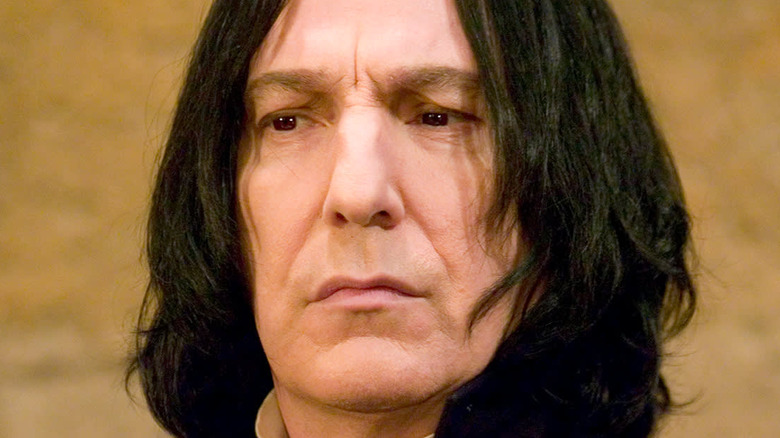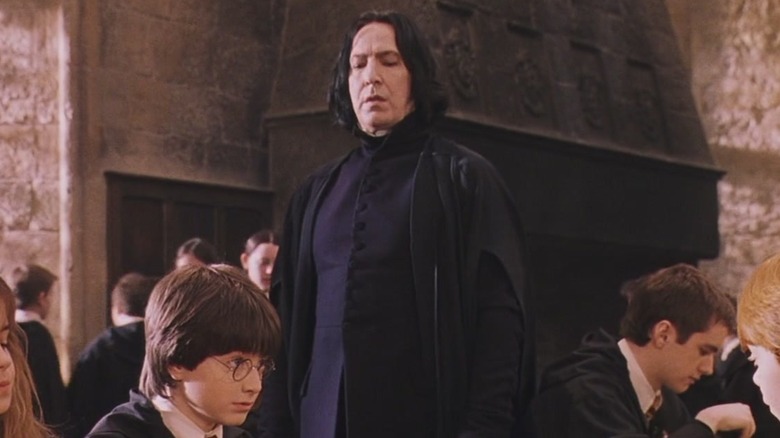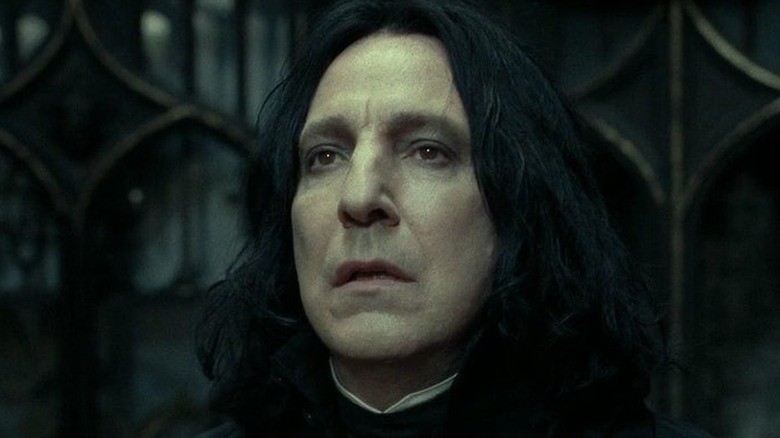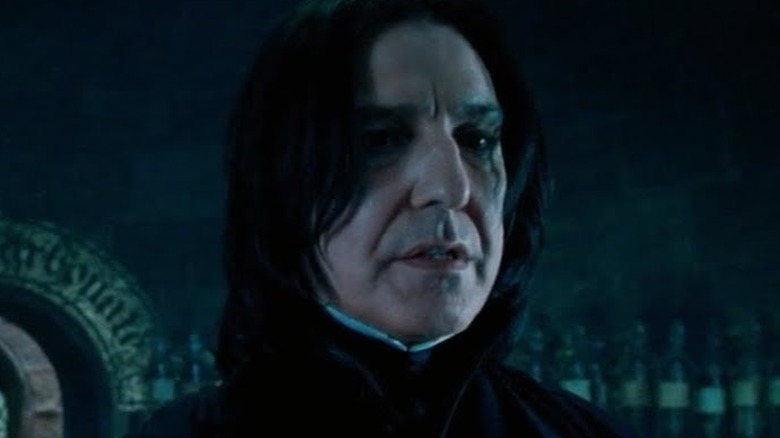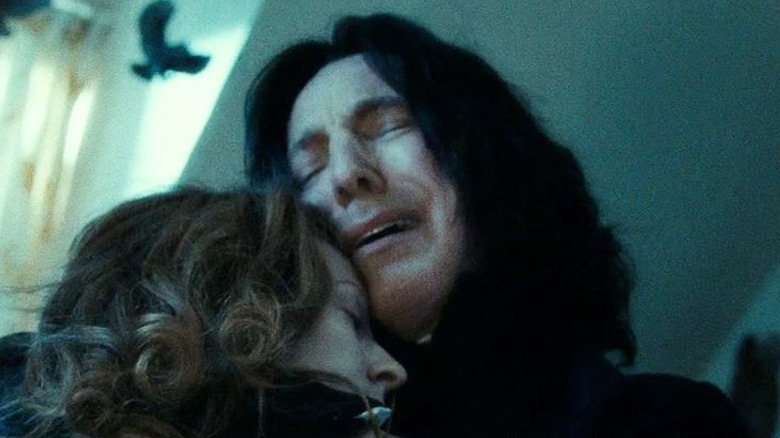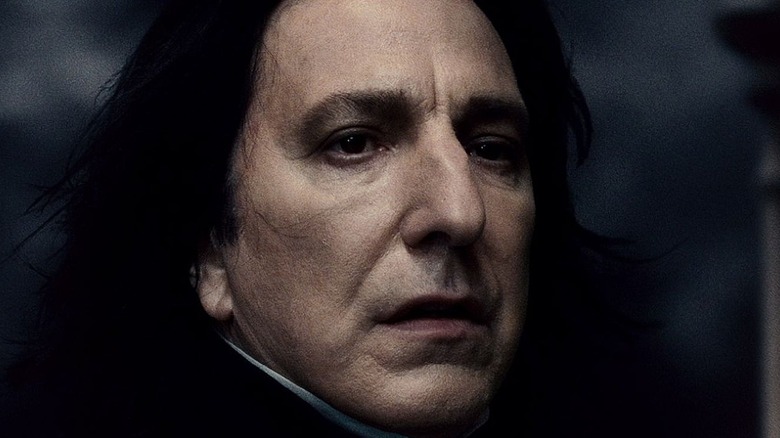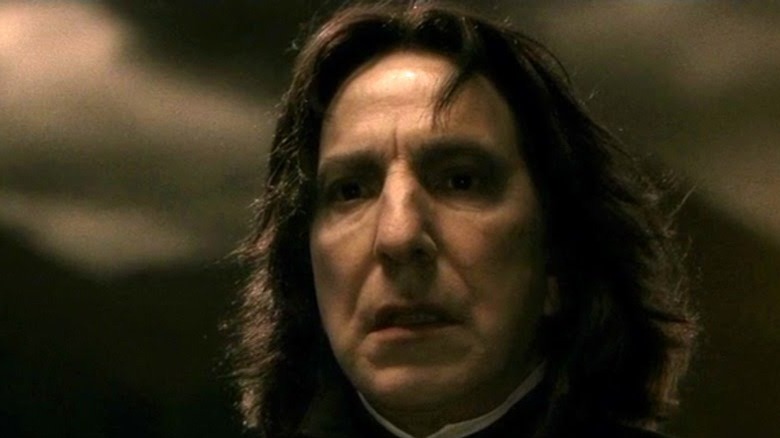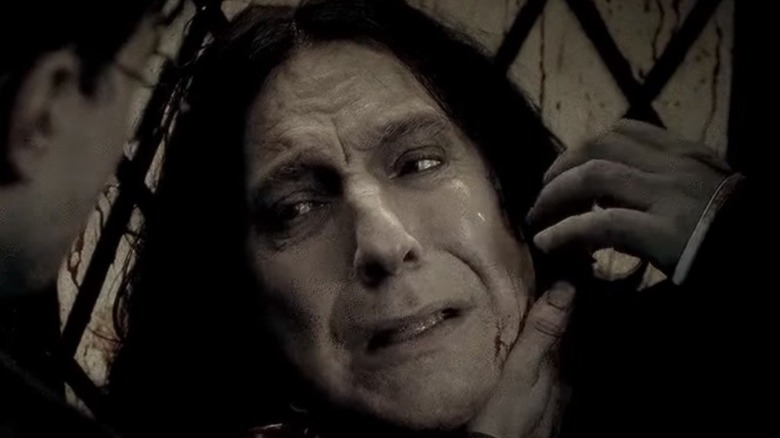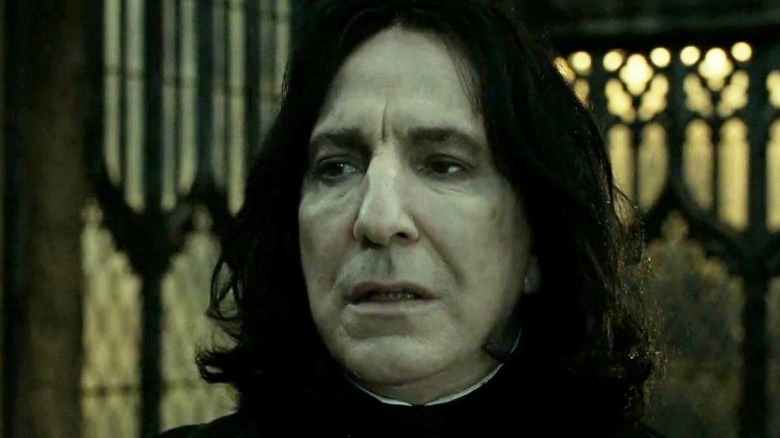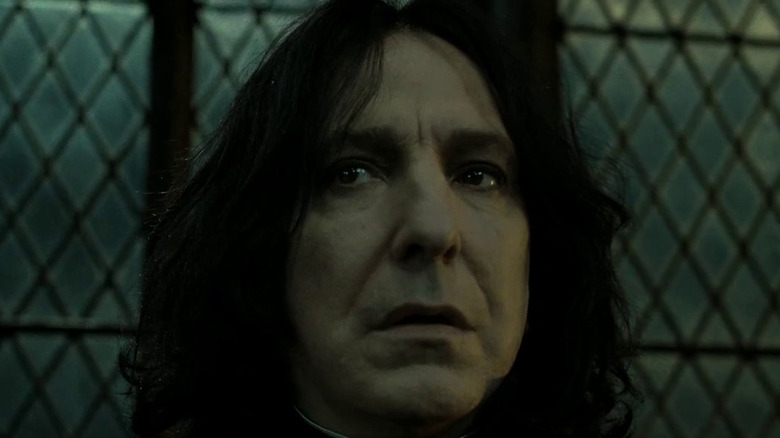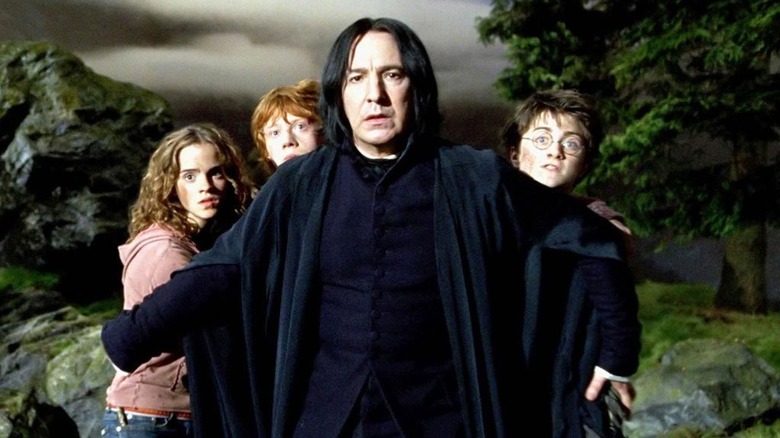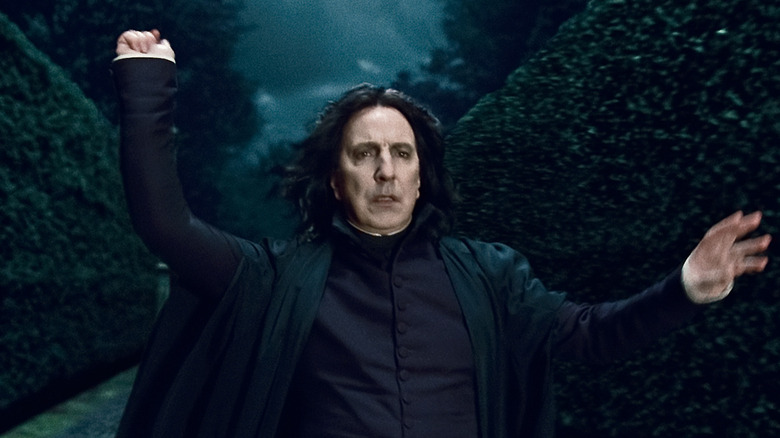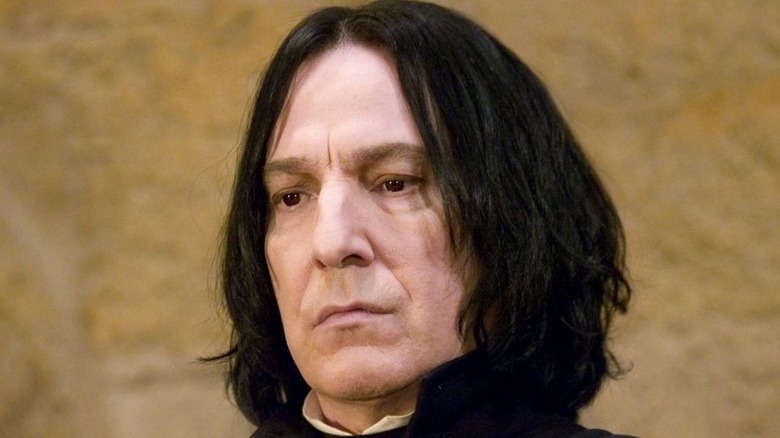Most Memorable Snape Quotes In The Harry Potter Movies
The "Harry Potter" movies achieved the impossible in so many ways. They managed to bring to life the magic that an entire generation felt when first reading the books. They made Hogwarts seem real, allowed audiences to feel the same wonder as the titular Boy Who Lived, and introduced millions to one of the most charming coming-of-age stories in recent memory. But best of all, the "Harry Potter" movies gave the late, great Alan Rickman the opportunity to embody the series's deepest, most tragic character –- and in many ways, its hero –- Severus Snape.
Snape is not only the heart of the franchise but its arteries and veins. His story, from his introduction to a young Lily Potter to his last tears before dying –- the very tears that showed Harry how to finally defeat Voldemort –- snake through each movie. They envelope every character and moment, inflating them with a rich lifeblood born from Snape's secret double (and triple) lives. When the series grows deeper, it does so by virtue of Snape's secret loves and cloak-and-dagger objectives.
With the "Harry Potter 20th Anniversary: Return to Hogwarts" special now streaming, this is the perfect time to look back at the life of Severus Snape and some of his best moments. Here are some of the most memorable Snape quotes in the "Harry Potter" movies.
Mr. Potter
The overwhelming majority of Professor Snape's most memorable quotes come but once. Whether hilarious or heartbreaking, they are unique lines of dialogue bespoke to the situation at hand. A professor and alchemical genius, Snape can be as articulate as he is verbose, but his — or perhaps Rickman's — flair for the dramatic lets Snape sometimes say more with less. There is no finer example than how Snape addresses Harry:
"Mr. Potter..."
With his iconic basso drawl, Posh English accent, and just the right dash of vocal fry, Rickman expertly managed to make something as simple as a character's name chilling and utterly soaked with contempt. He first unfurls this nominal weapon in "Harry Potter and the Sorcerer's Stone" at the start of Harry's first potions class. After he lets "Mr. Potter..." drag out, he follows it with a pause so pregnant, you'd swear it had triplets. Then he continues his derision with an equally long, dry "Our. New. Celebrity..." The line has since become the go-to dialogue for Snape impressions, as it packs so much of his (seemingly) barbed personality into such a small package.
Always
There is no end to the tragedy that surrounds and infects the life of Severus Snape. Seemingly from birth to death (and due to the Pensieve, even a little afterward), the man was doomed to suffer. Between his struggles at home, at school, and his eventual initiation into a death cult, Snape never lived the charmed life he deserved. But though there are many to choose from, the single most devastating tragedy in Snape's life, both in pain and duration, was his unrequited love for Lily Potter. In "Harry Potter and the Half-Blood Prince," set 15 years after Lily's death at the hands of Voldemort, Snape reveals to Dumbledore the shape of his Patronus: a doe. The same as Lily's. Dumbledore, surprised by the longevity and depth of Snape's love for Lily, asks:
"Lily? After all this time?" Snape replies, simply: "Always."
For many fans, this is the single most heartbreaking moment in the entire franchise. This was the moment that many fans received their first glimpse into Snape's true nature, or at least one of its many facets. Suddenly, Snape as a person clicked for audiences. Instead of a two-dimensional cardboard cutout to be propped up wherever a scowl was needed, Snape became the protagonist of his own story. The line, like Snape's love, will live on far beyond its time.
Obviously
The relationship between Snape and Dolores Umbridge was a comedic treat from the start. The two were opposites at every level. Snape was a selfless hero playing the role of dark minion, and Umbridge was a wicked witch playing the role of a kind, bubbly caregiver. To top it off, Umbridge was appointed Defense Against the Dark Arts professor in her first year at Hogwarts, a position Snape had sought for years. When the two interacted, sparks were bound to fly, but given the precarious position(s) Snape had been forced into, he had to keep his irritation concealed. One of their best moments comes when Umbridge roasts Snape in front of his students, rhetorically asking:
"You applied first for the Defense against the Dark Arts post, is that correct?" Snape replies, "Yes."
Umbridge continues: "But you were unsuccessful?" Snape then forces out an ever-so-sarcastic "Obviously..."
This scene works on multiple levels. For one, as it occurs before viewers knew the full extent of Snape's heroism, it's cathartic seeing the crotchety wet blanket get his just desserts. For another, there aren't many actors born to deliver sarcasm as much as Alan Rickman was — nor are there characters created for it like Snape.
Anything
In nearly every minute of his screen time, Professor Severus Snape is cool, composed, and confident. Especially to his students, he presented a veneer of otherworldliness as an untouchable, undefeatable wizard and scholar. That's why the few, precious moments in which we're able to peek behind the curtain and see Snape frantic, emotional, and desperate hit hard. No exchange shows Snape as desperate as his meeting with Dumbledore just after the death of Lily Potter. Horrified with the role he played in her death, Snape begs Dumbledore to save the only pieces of her that remain: her family.
Through sobs, he begs, "Hide them. Hide them all." Dumbledore counters with, "What will you give me in exchange, Severus?" Snape, pleading, responds with "Anything."
This is the exact moment Dumbledore chooses to spare Snape, rehabilitate him, and employ him, instead of killing him outright. Though Snape had been a Death Eater, his love for Lily and his willingness to sacrifice himself to save her family — even after her death — convinces Dumbledore of his integrity. From then on, Snape vows to teach Harry and protect him, even –- and especially — from Snape's former master, Voldemort.
Pig for slaughter
Following his bargain with Dumbledore, Snape dedicated his life to the protection of young Harry. Out of both love and a sense of duty, he kept tabs on the child and secretly aided him when he needed it most. Snape was never far from Harry and always quick to lend a counter-curse or special lesson as needed. That dedication is what caused Snape to openly scorn Dumbledore when the headmaster revealed to Snape that Harry would have to die. Dumbledore, ever the puppet master, had always known that Harry was himself a Horcrux and would have to die — at the proper moment. When Snape finds out, he confronts Dumbledore:
"You kept him alive so that he could die at the proper moment. You have been raising him like a pig for slaughter."
For the better part of six movies, viewers thought Dumbledore to be Harry's warm-hearted mentor and makeshift father figure, and Snape to be the cold, bitter authority that kept Harry on a leash. By voicing such raw and passionate concern for Harry's life, Snape proved that viewers' assumptions were backward. No matter how he may have acted, it was always Snape whose warm heart beat for Harry.
The Half-Blood Prince
One of the central mysteries in "The Half-Blood Prince" is the identity of the titular wizard, whose notes in Harry's potions textbook showed him to be a master spell-caster. Though some of the Prince's spells were dangerous, like the bloody Sectumsempra, their power and usefulness were undeniable. Harry began using the Prince's home-brewed formulae and spells, leading among other things to some of his few academic successes of the series.
After seeing what he believed to be the cold-blooded murder of Dumbledore by Snape, Harry pursues him in a rage. Remembering the power of the Prince's spells and unconcerned with their violence, Harry casts them at the fleeing Snape, who deftly counters them and replies:
"You dare use my own spells against me? Yes, I am the Half-Blood Prince."
This came as a shock to most and remains one of the movies' more dramatic reveals. Not only did it appear to hammer home the idea of Snape as a cruel, wicked wizard (after all, who else would create Sectumsempra?), but it also made it clear that Snape was no pushover. For Snape to be the Half-Blood Prince, he would had to have been a genius from an early age. When combined with his apparent willingness to betray and murder Dumbledore, that made Snape a figure to be feared and respected.
Your mother's eyes
Many of Snape's most indelible moments come from his memories, gleaned from his last tears and the Pensieve. However, just before supplying Harry with his tears, Snape whispers one of his most moving lines:
"Look at me. You have your mother's eyes."
Those are Snape's dying words. He chokes them out while in Harry's arms, and that five-word phrase carries a crushing amount of weight. In Snape's last moments on Earth, all his thoughts are on Lily Potter, the love of his life. What brainpower remains fixates on Harry, the last vestige of Lily's grace and a hero worth dying for. After a lifetime of pain, deception, and longing, Snape was finally on the edge of resting and could do so confidently, knowing that Lily lived on in Harry.
Lily's eyes were always a symbol of her light and lifeforce, and to Snape — her greatest admirer — seeing them carry on through Harry is the one bright spot of his dark destiny. "Harry Potter and the Deathly Hallows: Part 2" excelled at balancing overwhelming darkness with small glimmers of sunshine, and no dialogue encapsulates that better than Snape's final words to Harry.
Life isn't fair
In "Harry Potter and the Order of the Phoenix," Dumbledore tasks Snape with teaching Harry Occlumency, the art of protecting one's mind from intrusion. Snape, ever the dutiful servant and dedicated teacher, doesn't bat an eye. Though pulled from his chambers in the middle of the night and forced to work overtime, the professor doesn't skip a beat and starts instructing Harry immediately. Harry, on the other hand, is less keen on hard work. He spends the lesson complaining about its pace and rigor, and Snape decides to match his bite with tough love, saying:
"You and Black are two of a kind, sentimental children forever whining about how bitterly unfair your lives have been. Well, it may have escaped your notice but life isn't fair."
For the overworked and under-appreciated Snape, who at that point had spent years living a double life, to hear Harry complain was sickening. Out of a curious mixture of love for the boy and contempt for his behavior, Snape rips into Harry and his loved ones. The whole scene, especially the parts of it surrounding Harry's unintentional foray into Snape's memories, is wall-to-wall character development of the highest caliber.
I don't want to do this anymore
Severus Snape and Albus Dumbledore brought out the best and worst in each other. Their relationship, alternating between mentor and mentee, employer and employee, father and son, and philosophical rivals, was fertile ground for compelling dialogue. That's why it's no surprise that so many of Snape's most memorable quotes come during his interactions with the secretive old headmaster. Their unique relationship granted both unparalleled access to the other and one desperate plea of Snape's demonstrates that best:
"Have you ever considered that you ask too much? That you take too much for granted? Has it ever crossed your brilliant mind that I don't want to do this anymore?"
It's exceedingly rare to hear anyone, especially an employee of Hogwarts, question Dumbledore and his wisdom so openly. Likewise, it's just as rare to hear the usually stoic, reticent Snape break down and reveal his soft inner self. Snape spent years being used as a pawn by both sides of the magic war, and it was only to Dumbledore — ironically, one of the chess players — that Snape could express his true exasperation and regret. Seeing the proud Prince beg is a weighty moment, one that lasts with audiences.
Insufferable know-it-all
One of Snape's trademarks that makes him so endearing to his fans and so loathed by his students is his terse, piercing barbs. If necessary, the intimidating wizard is able to thoroughly destroy a target's confidence in only a handful of words. Though Harry bore the brunt of that stinging expertise, Hermione and Ron became occasional targets themselves. For Ron, the scolding was more or less deserved due to the young wizard's penchant for laziness. But for Hermione, Snape's wrath seemed to find her only because her exceptional cleverness held up a mirror to Snape's own. As a student, Snape was similar to Hermione, and if there is one topic that Snape does not want to be reminded of, it's his childhood. In "Harry Potter and the Prisoner of Azkaban," Snape takes time out of his class to throw a stone at that perfect little mirror, saying:
"That is the second time you've spoken out of turn, Ms. Granger. Are you incapable of restraining yourself, or do you take pride in being an insufferable know-it-all?"
This is just plain funny, especially because (as Ron then points out) it's somewhat true. Though Hermione was only answering one of Snape's questions, and doing so correctly at that, she did butt in despite not being called on. Her need to be the most intelligent, and to be seen doing it, is uncomfortably similar to Snape's own.
Subtle science and exact art
In contrast to Snape's pointed, surgical strikes, there are his aforementioned trips into verbosity and grandiloquence. One of the best of these prosaic forays comes in the form of his very first speech introducing new Hogwarts students to his potions class. He simultaneously throws shade and cultivates wonder in that uniquely Snape-ish fashion, saying:
"I don't expect many of you to appreciate the subtle science and exact art that is potion-making. However, for those select few who possess the predisposition, I can teach you how to bewitch the mind and ensnare the senses. I can tell you how to bottle fame, brew glory, and even put a stopper in death."
We saw many teachers at Hogwarts introduce their courses and explain the merit of their arts and sciences, but not one of them had a sales pitch like Snape. Most just brought deadly animals and plants into the classroom and let them roam free, inevitably injuring students. Snape was the one teacher whose introduction made you want to learn. Though he immediately came across as a prickly pear, Snape alone was honest and inspirational regarding the true power of magic.
No idea
No other character in any "Harry Potter" movie had to walk a tightrope like Severus Snape. He needed to keep up his teaching position, his secret guardianship of Harry, his standing amongst the Order of the Phoenix members, his standing among the Death Eaters, and his increasingly demanding missions from Dumbledore. Snape shows off this agility best during one scene in "Harry Potter and the Order of the Phoenix." When Umbridge calls Snape to her office to help interrogate Harry, she asks: "Have you brought the Veritaserum?"
Snape answers with, "I'm afraid you have used up all my stores interrogating students, the last of it on Miss Chang. Unless you wish to poison Potter — and I assure you, I would have the greatest sympathy if you did — I cannot help you." Harry then desperately bursts out in code: "He's got Padfoot. He's got Padfoot at the place where it's hidden." Umbridge then questions Snape: "Padfoot? What is Padfoot? Where is what hidden? What is he talking about, Snape?" Snape replies coolly, "No idea."
In a few simple words, the professor was able to maintain the appearance of detesting Harry, support Umbridge's merciless interrogations of the students, give Harry a subtle cue that he understood his coded message of distress, and feign ignorance of the code's existence. It's worth rewatching the "Harry Potter" films if for no other reason than to see Snape play the angles. It's a testament both to the character and to Alan Rickman's masterful portrayal of him that so many of Snape's quotes are still memorable to this day.
